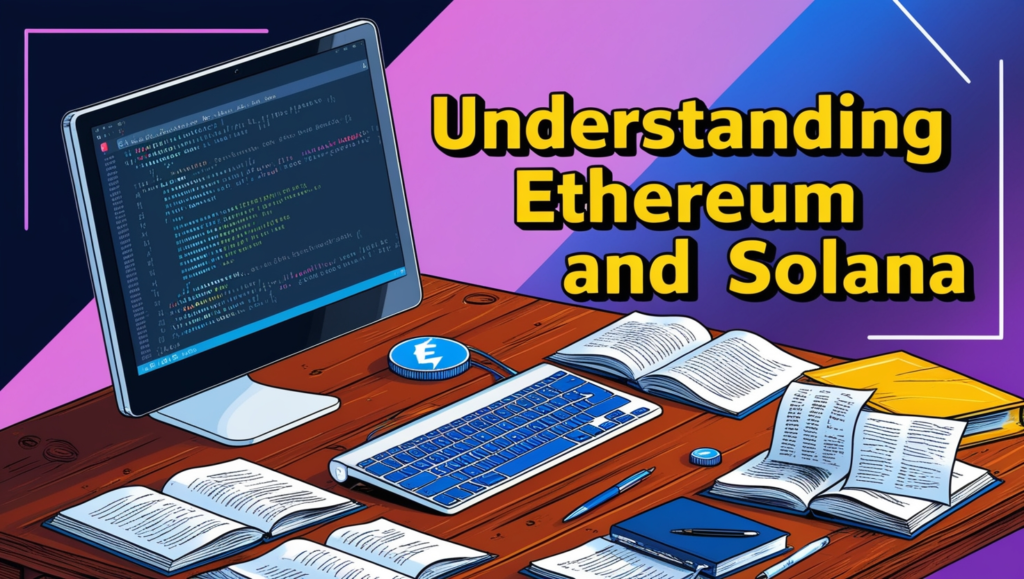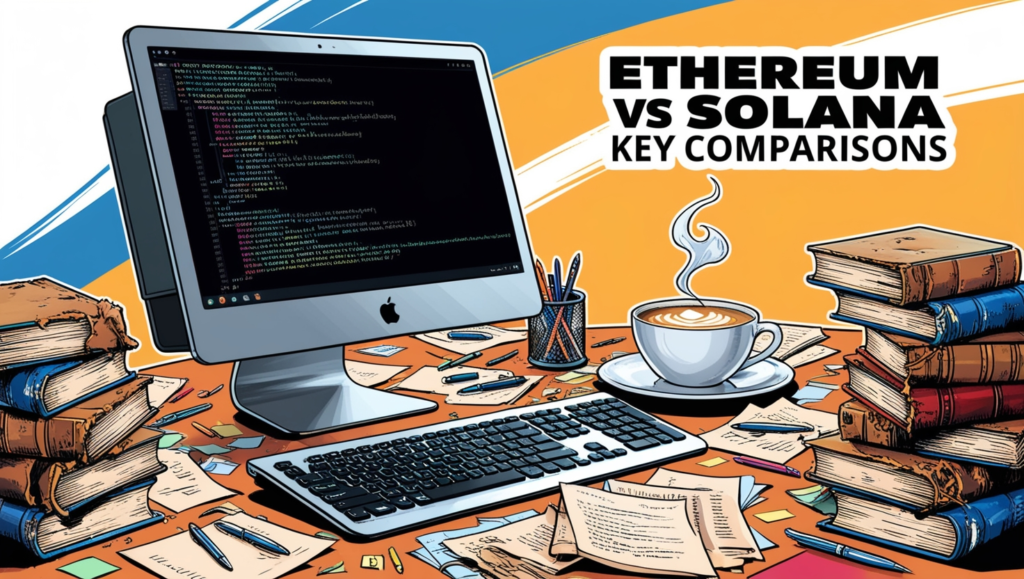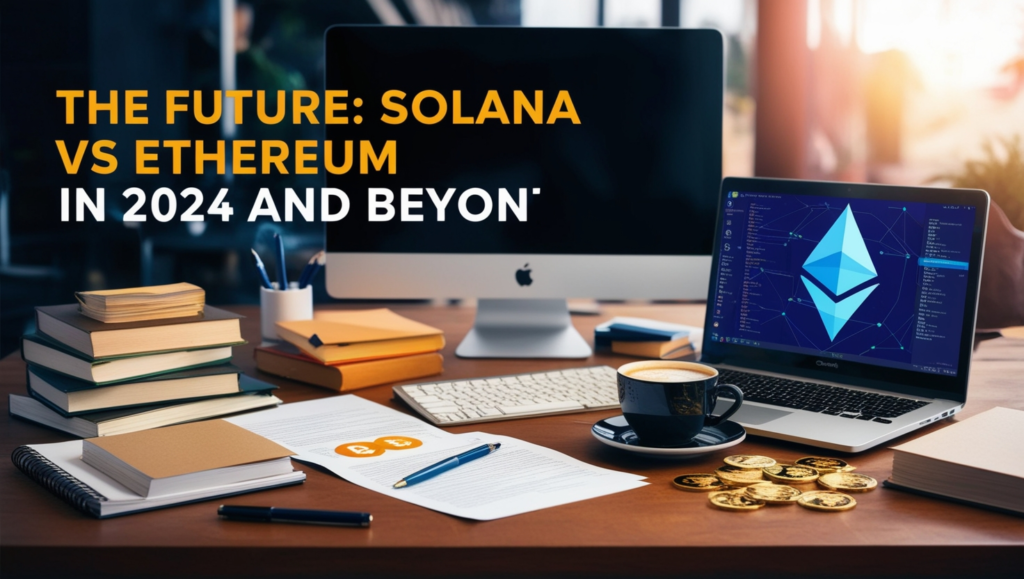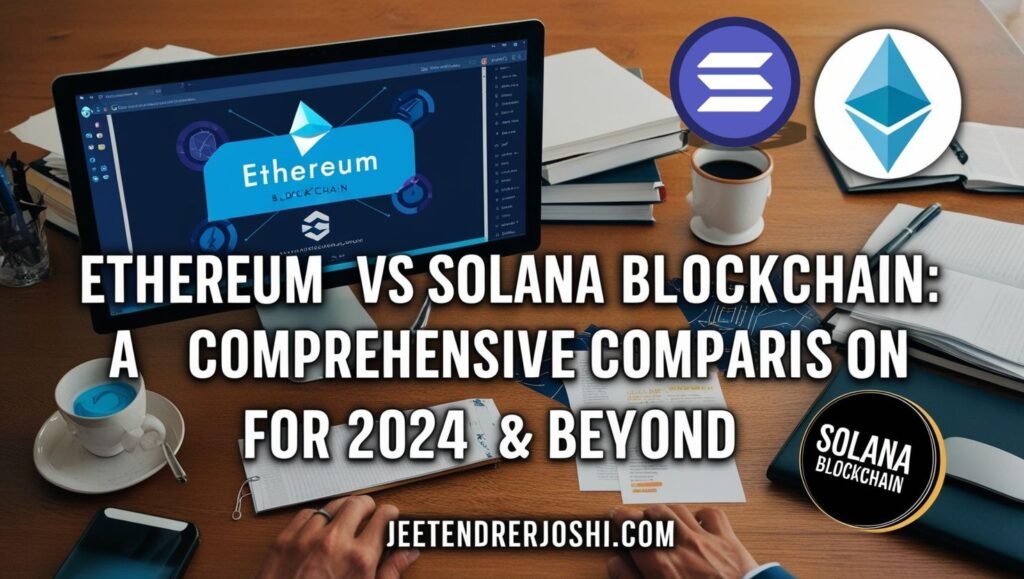Ethereum Vs Solana Blockchain: When it comes to blockchain technology, Ethereum and Solana are two names that dominate the conversation. Both offer unique features, strengths, and ecosystems, making it essential for developers, investors, and enthusiasts to understand the key differences. Whether you’re curious about Solana vs Ethereum blockchain performance, scalability, or long-term potential, this article has got you covered.
In this blog, we’ll explore the ins and outs of Ethereum vs Solana, touching on development, investment potential, and what the future holds for these two giants in 2024 and beyond.
Table of Contents
Understanding Ethereum and Solana

What is Ethereum?
Launched in 2015, Ethereum is the pioneer of smart contract platforms. Its programming language, Solidity, allows developers to create decentralized applications (dApps), revolutionizing industries like finance, gaming, and supply chain management.
Ethereum recently transitioned to Ethereum 2.0, a proof-of-stake (PoS) consensus mechanism, improving energy efficiency and scalability. This upgrade has made Ethereum more appealing for long-term blockchain development.
What is Solana?
Solana, on the other hand, burst onto the scene in 2020 as a high-performance blockchain platform. Known for its incredible speed and low transaction costs, Solana is ideal for applications that require fast processing times, such as DeFi and NFTs. Its Rust-based programming language sets it apart, offering unique advantages for developers.
While Ethereum has a head start in market share, Solana’s innovative approach makes it a strong competitor, especially for long-term growth.
Ethereum vs Solana: Key Comparisons

1. Consensus Mechanism: Proof of Stake vs Proof of History
Ethereum uses the Proof of Stake (PoS) model, which aligns with its sustainability goals. The shift to Ethereum 2.0 has reduced energy consumption by over 99%, making it more eco-friendly.
Solana employs a unique Proof of History (PoH) mechanism. This innovative approach timestamps transactions before processing, ensuring lightning-fast speeds. Solana can handle up to 65,000 transactions per second (TPS), significantly outpacing Ethereum’s current capabilities.
2. Transaction Speed and Scalability
- Ethereum Blockchain Development: Despite the transition to Ethereum 2.0, scalability remains a challenge. The network relies on Layer 2 solutions like Polygon for faster processing.
- Solana Blockchain Development: Solana’s high-speed architecture makes it a natural choice for developers building real-time applications. Its ability to scale without additional layers gives it a competitive edge.
3. Programming Languages: Solidity vs Rust

A notable difference in Solana vs Ethereum blockchain development lies in their programming languages:
- Solidity (Ethereum): Easier to learn and widely adopted, making it beginner-friendly.
- Rust (Solana): Offers better performance but has a steeper learning curve. Developers seeking efficiency and speed often prefer Rust.
4. Market Cap and Ecosystem
As of 2024, Ethereum dominates the blockchain space with a market cap exceeding $200 billion, dwarfing Solana’s $8 billion valuation. However, when analyzing market cap Solana vs Ethereum, it’s essential to consider that Solana is still in its growth phase, offering immense potential for long-term investments.
5. Investment Potential: Is Solana a Good Investment?
For investors wondering, “Is Solana a good investment?”, the answer depends on your risk tolerance and timeline.
- Ethereum’s Stability: Backed by years of proven utility and a massive developer community, Ethereum is the safer choice for long-term investments.
- Solana’s Growth: Solana appeals to high-risk, high-reward investors due to its rapid innovation and potential to disrupt Ethereum in niche markets like NFTs.
6. NFTs and DeFi: A Use Case Battle
Both blockchains have seen massive adoption in the DeFi and NFT spaces:
- Ethereum: Still the go-to blockchain for high-value NFT projects and DeFi platforms.
- Solana: Popular for affordable NFT trading and micro-transactions.
If your priority is low fees and fast transactions, Solana offers better value. However, Ethereum provides unmatched security and network effects.
7. The Future: Solana vs Ethereum in 2024 and Beyond

Looking ahead to Ethereum vs Solana 2024 and 2025, both blockchains are poised for significant advancements:
- Ethereum will continue to enhance its Layer 2 solutions and focus on decentralization.
- Solana aims to solidify its position as the blockchain of choice for speed-intensive applications, despite recent downtime challenges.
For developers and investors, the choice between Solana Blockchain vs Ethereum Blockchain will depend on specific use cases and risk preferences.
Strengths and Weaknesses: A Quick Recap
| Feature | Ethereum | Solana |
|---|---|---|
| Speed | ~15 TPS | Up to 65,000 TPS |
| Transaction Costs | High (~$5-50) | Low (~$0.00025 per transaction) |
| Security | Extremely secure | Secure but less decentralized |
| Ecosystem | Established and massive | Growing rapidly |
| Development | Easier with Solidity | Faster with Rust |
Which Blockchain Should You Choose?
The battle between Solana vs Ethereum isn’t about one being inherently better—it’s about choosing the right tool for the job.
- Pick Ethereum if: You value stability, security, and an established ecosystem. Ethereum remains the king of DeFi and high-value NFTs.
- Pick Solana if: You’re building real-time applications or seeking lower costs and faster transaction speeds. Solana’s unique Proof of History system is a game-changer for developers and investors alike.
Conclusion: Solana vs Ethereum Long-Term Prospects
The Solana vs Ethereum debate will likely intensify as both blockchains continue to evolve. While Ethereum’s dominance makes it the go-to platform for secure and decentralized applications, Solana’s innovative approach to scalability and speed ensures it remains a worthy competitor.
Ultimately, the future of Solana Blockchain vs Ethereum Blockchain depends on your needs, whether as a developer, investor, or enthusiast. Both platforms have a bright future ahead in 2024 and beyond.
By staying informed about developments in Ethereum vs Solana 2025, you can make smarter decisions for your blockchain journey. Whether you’re coding the next big dApp or exploring crypto investments, choosing the right blockchain is a step towards success.


